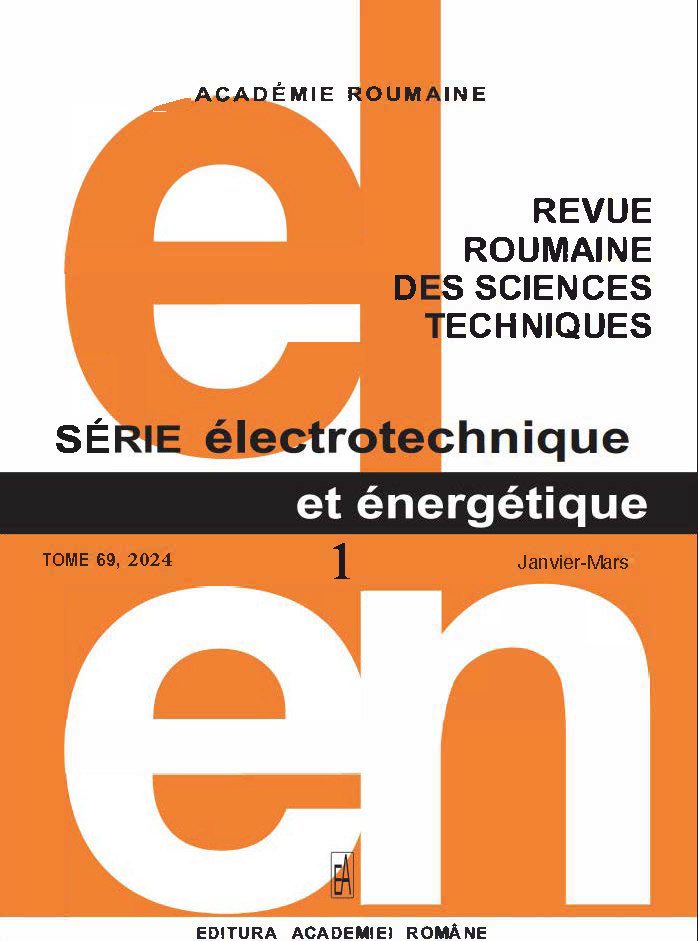SECOND ORDER SLIDING MODE CONTROL FOR ISLANDED AC MICROGRIDS WITH RENEWABLE POWER RESOURCES
COMMANDE À MODE GLISSANT DE DEUXIÈME ORDRE POUR LES MICRO-RÉSEAUX CA ILOTÉS AVEC RESSOURCES ÉNERGÉTIQUES RENOUVELABLES
DOI:
https://doi.org/10.59277/RRST-EE.2024.1.7Keywords:
Microgrid (MG), Master-slave strategyAbstract
Microgrids have attracted a lot of attention and are the future power systems. This paper proposes a new control scheme for islanded AC microgrid (MG) using master-slave technique. Stability and high performance are vital for islanded MG. Two second order sliding mode controls (SMCs) are designed in stationary reference frame for master and slave units to control the voltage and powers respectively. Both designed controls guarantee the convergence of considered outputs to their reference values. The proposed controls are robust, simple, chattering free and only need local measurements. The control method proposed in this paper can be easily extended to microgrids with any number of slave units and parallel connected inverters. The effectiveness of the proposed control scheme is verified through simulation results in SIMULINK/MATLAB environment and compared to feedback linearization control and a modified conventional SMC.
References
(1) M.M. Rezaei, J. Soltani, A robust control strategy for a grid-connected multi-bus microgrid under unbalanced load conditions, International Journal of Electrical Powers, and Energy Systems, 71, pp. 68–76 (2015).
(2) T. Caldognetto, P. Tenti, Microgrids operation based on master-slave cooperative control, IEEE Journal of Emerging and Selected Topics in Power Electronics, 2, 4, pp. 1081–1088 (2014).
(3) P. Monshizadeh, C. De Persis, N. Monshizadeh. A. van der Schaft, A communication-free master-slave microgrid with power sharing, 2016 American Control Conference (ACC), Boston, USA (2016).
(4) P. Kumar, M. Kumar, N. Pal, An efficient control approach of voltage and frequency regulation in an autonomous microgrid, Revue roumaine des sciences techniques, 66, 1, pp. 33–39 (2021).
(5) Y. Daili, A. Harrag, Improved decoupling virtual synchronous generator control strategy, Revue roumaine des sciences techniques, 66, 3, pp. 153–160 (2021).
(6) A. Alfergani, A. Khalil, Modeling and control of master-slave microgrid with communication delay, The 8th International Renewable Energy Congress (IREC 2017) (2017).
(7) H. Han, X. Hou, J. Yang, J. Wu, M. Su, J.M. Guerrero, Review of power-sharing control strategies for islanding operation of ac microgrids, IEEE Trans. On Smart Grid, 7, 1, pp. 1–16 (2015).
(8) J. Pinto, A. Carvalho, V. Morais, Power sharing in island microgrids, Frontiers in Energy Research, 8, Article 609218, pp. 1–14 (2021).
(9) A. Ghazanfari, M. Hamzeh, H. Mokhtari, H. Karimi, Active power management of multihybrid fuel cell/supercapacitor power conversion system in a medium voltage microgrid, IEEE Trans. On Smart Grid, 3, 4, pp. 1903–1910 (2012).
(10) M. Hamzeh, H. Karimi, H. Mokhtari, A new control strategy for a multi-bus mv microgrid under unbalanced conditions, IEEE Trans. On Power Systems, 27, 4, pp. 2225–2232 (2012).
(11) P.J. dos Santos Neto, T.A.S. Barros, J.P.C. Silveira, E.R. Filho, J.C. Vasquez, J.M. Guerrero, Power management techniques for grid-connected dc microgrids: a comparative evaluation, Applied Energy, 269, 115057, pp. 1–15 (2020).
(12) M.S. Mahmoud, O. Al-Buraiki, Two-level control for improving the performance of microgrid in islanded mode, 2014 IEEE 23rd International Symposium on Industrial Electronics (ISIE), Istanbul, Turkey, pp. 54–59 (2014).
(13) T. Yao, R. Ayyanar, Variable structure robust voltage regulator design for microgrid master-slave control, 2017 IEEE Energy Conversion Congress and Exposition (ECCE), Cincinnati, OH, USA (2017).
(14) H. Liang, Y. Dong, Y. Huang, C. Zheng, P. Li, Modeling of multiple master–slave control under island microgrid and stability analysis based on control parameter configuration, Energies, 11, 2223, pp. 1–18 (2018).
(15) J. Marchgraber, W. Gawlik, Investigation of black-starting and islanding capabilities of a battery energy storage system supplying a microgrid consisting of wind turbines, impedance- and motor-loads, Energies, 13, 5170, pp. 1–24 (2020).
(16) M.M. Rezaei, J. Soltani, Robust control of an islanded multi-bus microgrid based on input–output feedback linearization and sliding mode control, IET Generation, Transmission & Distribution, 9, 15, pp. 2447–2454 (2015).
(17) W. Perruquetti, J.P. Barbot, Sliding mode control in engineering, Marcel Dekker, Inc., NY (2002).
(18) A. Mehta, B. Naik, Sliding mode controllers for power electronic converters, Springer Nature, Singapore Pte Ltd. (2019).
(19) M. Cucuzzella, G.P. Incremona, A. Ferrara, Design of robust higher order sliding mode control for microgrids, IEEE Journal on Emerging and Selected Topics in Circuits and Systems, 5, 3, pp. 393–401 (2015).
(20) R. Seeber, M. Reichhartinger, Conditioned super-twisting algorithm for systems with saturated control action, Automatica, 116, pp. 1–9 (2020).
(21) H. Obeid, S. Laghrouche, L. Fridman, A barrier function based-adaptive super-twisting controller for wind energy conversion system, 2019 IEEE 58th Conference on Decision and Control (CDC), Palais des Congrès et des Expositions Nice Acropolis, Nice, France, December 11–13, pp. 7869–7874 (2019).
(22) R. Teodorescu, M. Liserre, P. Rodriguez, Grid converters for photovoltaic and wind power systems, John Wiley & Sons, Ltd, United Kingdom (2011).
Downloads
Published
Issue
Section
License
Copyright (c) 2024 REVUE ROUMAINE DES SCIENCES TECHNIQUES — SÉRIE ÉLECTROTECHNIQUE ET ÉNERGÉTIQUE

This work is licensed under a Creative Commons Attribution-NonCommercial-NoDerivatives 4.0 International License.


